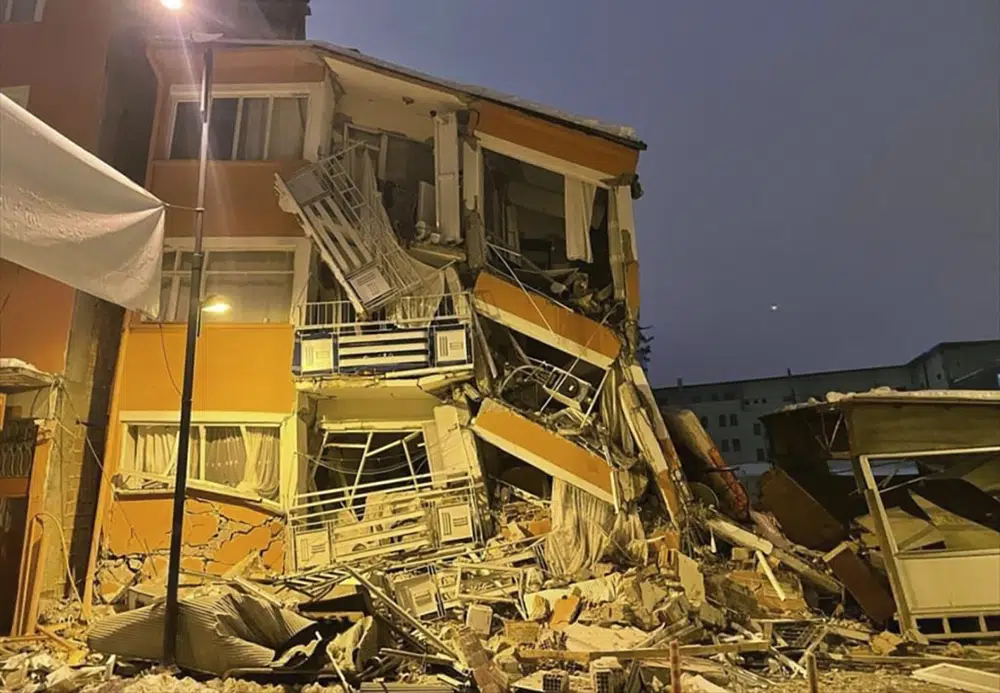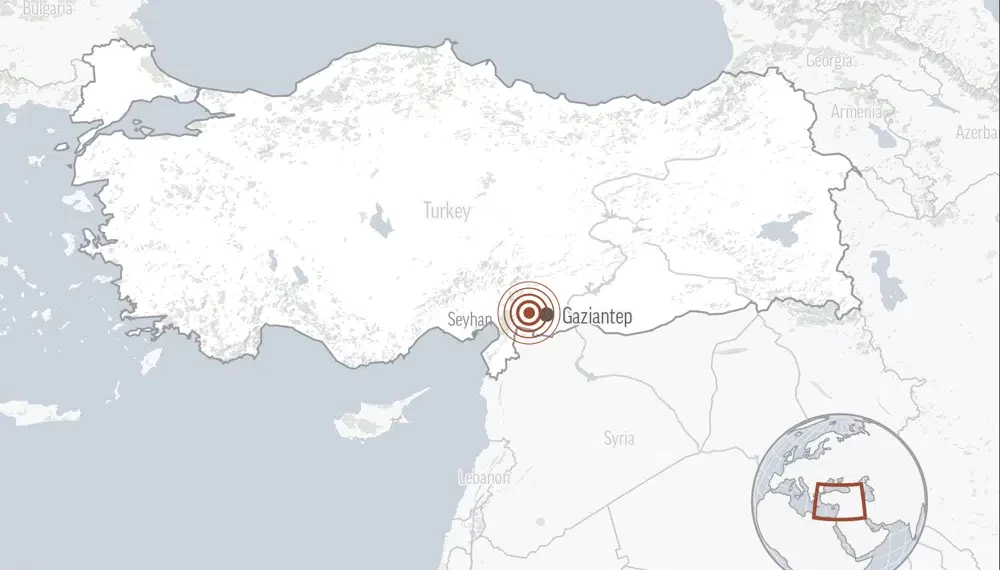A powerful 7.8 magnitude earthquake has hit southeast Turkey and Syria, toppling buildings and sending panicked residents pouring outside in a cold winter night.
At least 600 people were killed in both countries, hundreds were injured and the toll is expected to rise.
Rescue workers and residents frantically searched for survivors under the rubble of crushed buildings in multiple cities on both sides of the border.
In one quake-struck Turkish city, dozens pulled away chunks of concrete and twisted metal. People on the street shouted up to others inside a partially toppled apartment building, leaning dangerously.
The quake, felt as far away as Cairo, was centered north of the city of Gaziantep in an area about 90 kilometers (60 miles) from the Syrian border.
On the Syrian side of the border, the quake smashed opposition-held regions that are packed with some 4 million Syrians displaced from other parts of the country by the long civil war. Many of them live in decrepit conditions with little health care.
Turkish Interior Minister, Suleymon Soylu, disclosed that 10 cities were affected; Gaziantep, Kahramanmaras, Hatay, Osmaniye, Adiyaman, Malatya, Sanliurfa, Adana, Diyarbakir and Kilis.
On the Turkish side, the area has several large cities and is home to millions of Syrian refugees.
Turkish President, Recep Tayyip Erdogan noted on Twitter that “search and rescue teams were immediately dispatched” to the areas hit by the quake.
“We hope that we will get through this disaster together as soon as possible and with the least damage,” Erdogan added.
There were at least 6 aftershocks, and Interior Minister, Suleyman Soylu urged people not to enter damaged buildings due to the risks.
“Our priority is to bring out people trapped under ruined buildings and to transfer them to hospitals,” Soylu disclosed.
Initially Turkey’s Disaster and Emergency Management agency said at least 76 people in seven Turkish provinces were killed. The agency said 440 people were injured.
Presently, at least 284 people were killed in 10 Turkish provinces, with more than 2,000 injured, according to Turkey’s Vice President. The death toll in government-held areas of Syria have also climbed to 239 people, with about 600 injured.
The death toll in government-held areas of Syria from the quake climbed to 99, according to Syrian state media citing the Health Ministry. In addition, at least 334 people were injured in Syria. Earlier, 20 people were reported killed in rebel-held areas of the war-torn country.
At least 130 buildings tumbled down in Turkey’s Malatya province, neighboring the epicenter, Gov. Hulusi Sahin said. In the Turkish city of Diyarbakir, at least 15 buildings collapsed. Rescue teams called for silence as they listed for survivors in a toppled 11-story building.

One Of The World’s Most Active Earthquake Zones
Turkey sits on top of major fault lines and is frequently shaken by earthquakes.
The U.S. Geological Survey said the quake was centered about 33 kilometers (20 miles) from Gaziantep, a major city and provincial capital. It was centered 18 kilometers (11 miles) deep, and a strong 6.7 aftershock rumbled about 10 minutes later.
In northwest Syria, the opposition’s Syrian Civil Defense described the situation in the rebel-held region as “disastrous” adding that entire buildings have collapsed and people are trapped under the rubble.
The civil defense urged people to evacuate buildings to gather in open areas. Emergency rooms were full of injured, said Amjad Rass, President of the Syrian American Medical Society.
Syria’s state media reported that some buildings collapsed in the northern city of Aleppo and the central city of Hama.
In Damascus, buildings shook and many people went down to the streets in fear.
The quake jolted residents in Lebanon from beds, shaking buildings for about 40 seconds. Many residents of Beirut left their homes and took to the streets or drove in their cars away from buildings.
The earthquake came as the Middle East is experiencing a snowstorm that is expected to continue until Thursday.
Some 18,000 were killed in powerful earthquakes that hit northwest Turkey in 1999.
READ ALSO: Europe Bans Russian Diesel And Other Oil Products























